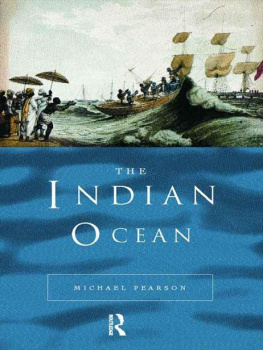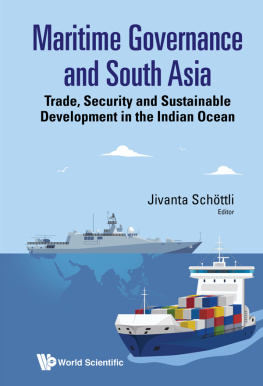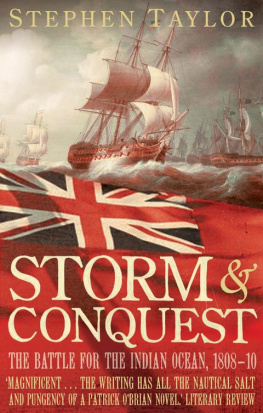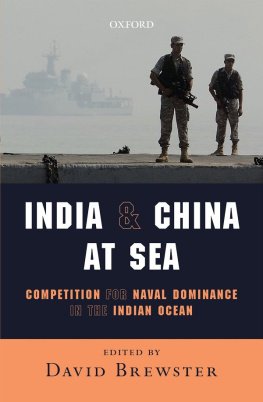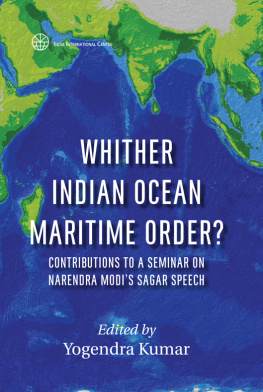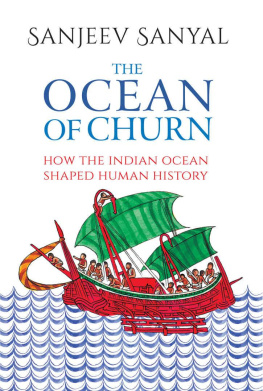The Indian Ocean
The Indian Ocean, used and travelled by humans for over 5,000 years, is by far the 'oldest' sea in history. In this stimulating and authoritative study, Michael Pearson reverses traditional maritime history and looks from the sea to its shores its impact on the land through trade, naval power, travel and scientific exploration. This vast ocean, both connecting and separating nations, has shaped many countries' cultures and ideologies through the movement of goods, people, ideas and religions across the sea.
The Indian Ocean moves from a discussion of physical aspects such as shape, winds, currents and boundaries, to a history from pre-Islamic times to the modern period of European dominance. Going far beyond pure maritime history, this compelling survey is an invaluable addition to political, cultural and economic world history.
Michael Pearson is Emeritus Professor at the University of New South Wales, Australia and Adjunct Professor at the University of Technology, Sydney. His previous publications include Port Cities and Intruders: The Swahili Coast, India, and Portugal in the Early Modern Era (1998) and Pious Passengers: The Hajj in Earlier Times (1994).
SEAS IN HISTORY
Series editor: Geoffrey Scammell
Published titles
THE ATLANTIC
THE BALTIC AND THE NORTH SEAS
Forthcoming titles
THE MEDITERRANEAN
THE PACIFIC
The Indian Ocean
Michael Pearson

LONDON AND NEW YORK
First published 2003
by Routledge
11 New Fetter Lane, London EC4P 4EE
Simultaneously published in the USA and Canada
by Routledge
29 West 35th Street, New York, NY 10001
Routledge is an imprint of the Taylor & Francis Group
This edition published in the Taylor & Francis e-Library, 2003.
2003 Michael Pearson
All rights reserved. No part of this book may be reprinted or reproduced or utilised in any form or by any electronic, mechanical, or other means, now known or hereafter invented, including photocopying and recording, or in any information storage or retrieval system, without permission in writing from the publishers.
British Library Cataloguing in Publication Data
A catalogue record for this book is available from the British Library
Library of Congress Cataloging in Publication Data
has been applied for
ISBN 0-203-41413-6 Master e-book ISBN
ISBN 0-203-41429-2 (MP PDA Format)
ISBN 0-415-21489-0 (Print Edition)
Copyright 2002/2003 . All rights reserved.
Reader's Guide
This ebook has been optimized for PDA.
Tables may have been presented to accommodate this Device's Limitations.
Table content may have been removed due to this Device's Limitations.
Image presentation is limited by this Device's Screen resolution.
All possible language characters have been included within the Font handling ability of this Device.
Dedication
TO THE MEMORY OF THOSE WHO SAILED THESE WATERS BEFORE ME:
SINNAPPAH ARASARATNAM, CHARLES BOXER, FRANK BROEZE,
ASHIN DAS GUPTA, HOLDEN FURBER AND DENYS LOMBARD
Contents
Illustrations
Series editor's preface
Seas and oceans cover roughly two-thirds of the surface of the globe. Since time immemorial they have provided mankind with food. In our own age they have been found to contain a rich diversity of resources whose exploitation remains a matter of contention. But the waters of the world are more than a prime instance of nature's munificence, or a handy dumping ground for the refuse of civilisation. They can be formidable obstacles to societies lacking the will or the means to cross them. Equally they can be a powerful stimulus to technology and a challenge to the skills of those who, for any reason, seek to use them. They can unite the cultures and economies of widely dispersed and radically different peoples, allowing knowledge, ideas and beliefs to be freely transmitted. The ports that develop along their littorals often have more in common with one another than with the states or communities in which they are sited.
Yet since seas are in themselves so rich,and since for centuries they alone gave access to the wealth of many distant regions, land powers have put forward ambitious claims to exercise authority over them. In Europe the justification or denial of such title has concerned thinkers and apologists since the days of Columbus and Vasco da Gama. Economic, political or strategic necessity, real or imagined, stimulated the growth of navies, which became formidable expressions of the power of the modern state. Seaborne commerce entailed the construction of ships which, however propelled, were for long among the most expensive and technologically advanced products of contemporary economies. The shipping industries of the world support a labour force whose social organisation and way of life radically differ from those of the rest of society.
But there is more to the history of the sea than the impressive chronicle of man's triumph over the elements, or of battles fought, freight's carried and ships launched. Everywhere seas and oceans have had a significant cultural influence on the civilisations adjoining them.
These themes, and much else besides, are examined by Michael Pearson in this illuminating and authoritative book. Professor Pearson is internationally renowned for his innovative studies of the Portuguese pioneers in India and for his stimulating writings on the Indian Ocean and maritime history in general. In this new and fascinating work he brings together the fruits of a lifetime's scholarship. The learning is impressive, but lightly borne, the writing felicitous and the whole enriched by a warm sympathy for, and close familiarity with the area. His book will be invaluable not only to scholars, but to all interested in the history of an ocean for centuries the meeting place of some of the world's most distinguished civilisations and of political, economic and cultural forces from much of the globe. It is particularly fitting too that this study is from a scholar based in Australia, the source in recent years of so many seminal ideas and works on the history of the sea.
Geoffrey Scammell
Preface
My thanks to my former colleagues in the School of History, University of New South Wales, especially its several Heads of School, and to successive Deans of the Faculty of Arts and Social Sciences. Onesimo Almeida and Charles Neu made it possible for me to spend a very productive (and extremely underemployed) four months at Brown University in the Fall of 2000. Librarians on four continents have been universally helpful. My thanks to Geoffrey Scammell for first inviting me to undertake this task, which fell to me after the untimely death of a dear colleague and friend, Ashin Das Gupta. Victoria Peters was a firm, but supportive, senior editor at Routledge, and is responsible for this book not being about twice as long as it is. For research assistance I thank Philippa Colin, and (yet again) Martin Braach-Maksvytis. My immediate family, Denni and James, have always taken a keen interest, while Ben and Mathew supported me from afar.
Michael Pearson
A note on names and measures
As is usual, deciding on these matters has been a perplexing task. I use modern, indigenous, spellings of place names when I consider they have achieved wide currency: thus Mumbai, Melaka, Kolkata, Chennai. When this is not the case I have used older, more familiar, spellings: thus Calicut, not Kozhikode. I am aware that many readers will be more used to Bombay than to Mumbai. However, many of these major ports have had several name changes over the centuries, and to follow these would be a confusing task indeed. Hence I use the most widely accepted modern name throughout this book.
Next page
